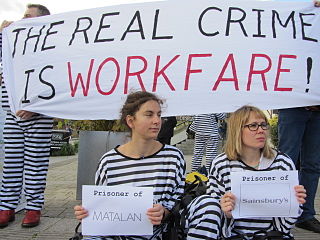Related Research Articles

A pension is a fund into which a sum of money is added during an employee's employment years and from which payments are drawn to support the person's retirement from work in the form of periodic payments. A pension may be a "defined benefit plan", where a fixed sum is paid regularly to a person, or a "defined contribution plan", under which a fixed sum is invested that then becomes available at retirement age. Pensions should not be confused with severance pay; the former is usually paid in regular amounts for life after retirement, while the latter is typically paid as a fixed amount after involuntary termination of employment before retirement.
Unemployment benefits, also called unemployment insurance, unemployment payment, unemployment compensation, or simply unemployment, are payments made by authorized bodies to unemployed people. In the United States, benefits are funded by a compulsory governmental insurance system, not taxes on individual citizens. Depending on the jurisdiction and the status of the person, those sums may be small, covering only basic needs, or may compensate the lost time proportionally to the previous earned salary.
The New Deal was a workfare programme introduced in the United Kingdom by the first New Labour government in 1998, initially funded by a one-off £5 billion windfall tax on privatised utility companies. The stated purpose was to reduce unemployment by providing training, subsidised employment and voluntary work to the unemployed. Spending on the New Deal was £1.3 billion in 2001.

The Department for Work and Pensions (DWP) is the British Government department responsible for welfare, pensions and child maintenance policy. As the UK's biggest public service department it administers the State Pension and a range of working age, disability and ill health benefits to around 20 million claimants and customers. It is the second largest governmental department in terms of employees, and the largest in terms of expenditure (£187bn).
Jobseeker's Allowance (JSA) is an unemployment benefit paid by the Government of the United Kingdom to people who are unemployed and actively seeking work. It is part of the social security benefits system and is intended to cover living expenses while the claimant is out of work.

Jobcentre Plus is part of the Department for Work and Pensions in the United Kingdom.
National Rural Employment Guarantee Act 2005 or NREGA, later renamed as the Mahatma Gandhi National Rural Employment Guarantee Act or MGNREGA in 2009, is an Indian labour law and social security measure that aims to guarantee the 'right to work'. This act was passed in 23 August 2005 under the UPA government of Prime Minister Manmohan Singh following tabling of the bill in parliament by the Minister for Rural Development Raghuvansh Prasad Singh.
In Australia, long service leave (LSL) is a period of additional paid leave granted to employees who have completed an extended period of service with an employer. Under Australian law, most employees are entitled to long service leave if they work for the same employer for a prolonged length of time, the threshold usually being between seven and ten years. Long service leave is separate from annual leave; employees receiving long service leave continue to accrue annual leave as normal and, at a minimum, as prescribed by the National Employment Standards.
Work for the Dole is an Australian Government program that is a form of workfare, or work-based welfare. It was first permanently enacted in 1998, having been trialled in 1997. It is one means by which job seekers can satisfy the "mutual obligation requirements" to receive the Newstart Allowance, now replaced by the JobSeeker Payment. Other "mutual obligation" measures can include: accredited study, part-time work, Australian Army Reserves, and volunteer work.
Social welfare has long been an important part of New Zealand society and a significant political issue. It is concerned with the provision by the state of benefits and services. Together with fiscal welfare and occupational welfare, it makes up the social policy of New Zealand. Social welfare is mostly funded through general taxation. Since the 1980s welfare has been provided on the basis of need; the exception is universal superannuation.
Social security in India includes a variety of statutory insurances and schemes bundled into a formerly complex and fragmented system run by the Indian government at the federal and the state level and is divided into three categories: non-contributory and tax-payer-funded, employer-funded and lastly, joint-funded. The system has since been universalised with the passing of The Code on Social Security, 2020. These cover most of the Indian population with adequate social protection in various situations in their lives. The Central Government of India's social security and welfare expenditures are a substantial portion of the official budget and as well as the budgets of social security bodies, and state and local governments play roles in developing and implementing social security policies. Additional welfare measure systems are also uniquely operated by various state governments. The government uses the unique identity number (Aadhar) that every Indian possesses to distribute welfare measures in India. The comprehensive social protection system of India can be categorised as the follows: social assistance and mandatory social security contributory schemes mostly related to employment. The Code on Social Security, 2020 is part of the Indian labor code that deals with employees' social security and have provisions on retirement pension and provident fund, healthcare insurance and medical benefits, sick pay and leaves, unemployment benefits and paid parental leaves. The largest social security programs backed by The Code on Social Security, 2020 are the Employees' Provident Fund Organisation for retirement pension, provident fund, life and disability insurance and the Employees' State Insurance for healthcare and unemployment benefits along with sick pays. There is also the National Pension System which is increasingly gaining popularity. These are funded through social insurance contributions on the payroll. While the National Food Security Act, 2013, that assures food security to all Indians, is funded through the general taxation. With the passing of the social security code by the Indian Parliament, the fragmented social security system was universalised, resembling the social security systems of most developed countries.

Employees' State Insurance Corporation is a statutory body under the ownership of Ministry of Labour and Employment, Government of India. The fund is managed by the Employees' State Insurance Corporation (ESIC) according to rules and regulations stipulated in the ESI Act 1948.
The poverty alleviation programs in India can be categorized based on whether it is targeted either for rural areas or urban areas in the country.

R v Secretary of State for Work and Pensions [2013] UKSC 68 is a United Kingdom constitutional law and labour law case that found the conduct of the Department for Work and Pensions "workfare" policy was unlawful. Caitlin Reilly, an unemployed geology graduate, and Jamieson Wilson, an unemployed driver, challenged the Jobcentre policy of making the unemployed work for private companies to get unemployment income. The outcome of the case affects over 3,000 claimants and entails around £130m unpaid benefits.

Workfare in the United Kingdom is a system of welfare regulations put into effect by UK governments at various times. Individuals subject to workfare must undertake work in return for their welfare benefit payments or risk losing them. Workfare policies are politically controversial. Supporters claim that such policies help people move off welfare and into employment whereas critics argue that they are analogous to slavery or indentured servitude and counterproductive in decreasing unemployment.
The Welfare Reform Act 2012 is an Act of Parliament in the United Kingdom which makes changes to the rules concerning a number of benefits offered within the British social security system. It was enacted by the Parliament of the United Kingdom on 8 March 2012.
The Office for administration and payment of individual entitlements, also known as the Paymaster's Office or PMO is a central office of the European Commission.
Unorganised Workers' Identification Number or UWIN is a proposed unique number to be issued as the identity proof to unorganised workers in India.
Unemployment in Hungary measured by the Hungarian Central Statistical Office shows the rate of unemployed individuals out of the labor force. The European Union's own statistical office, Eurostat also makes reports and predictions about the Hungarian job market and the unemployment rate in the country. The KSH's most recent unemployment data shows the unemployment rate for men 15-74 to be 3.3% and 4.1% for women.
As of 2011, 15.1% of people in Denmark had a basic activity disability, and 16.9% had an employment disability.
References
- ↑ "Belfast protests target businesses over unpaid work scheme". Belfasttelegraph– via www.belfasttelegraph.co.uk.